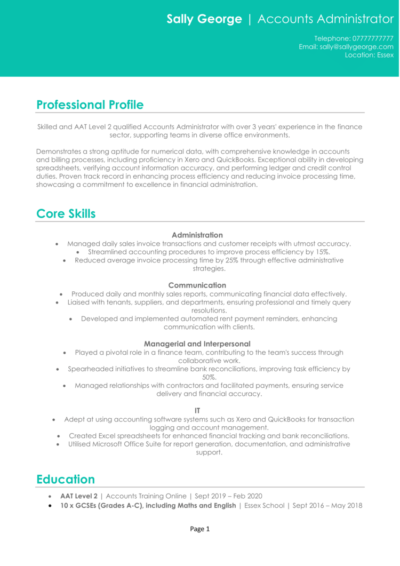Whether you’re switching careers, have gaps in your work history, or simply want to showcase your abilities over job titles, a skills-based CV can highlight what you do best.
This guide, along with a skills based CV example, will walk you through crafting a good CV that impresses recruiters, lands interviews, and opens doors, no matter where your experience lies.
Skills-based CV template

How to write your Skills-based CV
Learn how to create your own interview-winning Skills-based CV with this simple step-by-step guide.
From this guide, you’ll learn everything you need to know about producing a skills based CV, from when it should be used and why some people use it, to the essential sections that your own application should contain.
What is a skills based CV?
A skills based CV (also known as a functional CV) is a CV which emphasises your core skills. It differs from a traditional CV, which lists your past jobs and education in reverse chronological order.
Instead, it groups your skills into sections, with examples of how you’ve demonstrated them, making it ideal for career changers, those with employment gaps, or anyone whose skills are stronger than their job titles. Writing a CV in this way is a good idea to draw recruiters’ attention to your transferable skills and accomplishments.
When to use a skills based CV
A skills-based CV is perfect when your career path doesn’t fit neatly into a traditional format.
If you’re switching industries, re-entering the workforce after a break, or have a varied work history that lacks a clear progression, this type of CV allows you to focus on what really matters – your skills and what you can bring to the table.
It’s also a strong choice if your experience is more project-based or if you’ve gained relevant skills outside of formal employment, such as through volunteering or freelancing. In short, it’s your go-to option when showcasing your abilities is more important than outlining your job titles.
How to write a skills based CV
This format flips the script on traditional CVs, putting your skills and strengths front and centre. The key is to organise your CV so that your abilities take the spotlight, backed by examples that show recruiters you’re the perfect fit for the role.
While the format might differ from a standard CV, the goal is the same: showcase your fit for the role and land interviews.
Skills-based CV structure
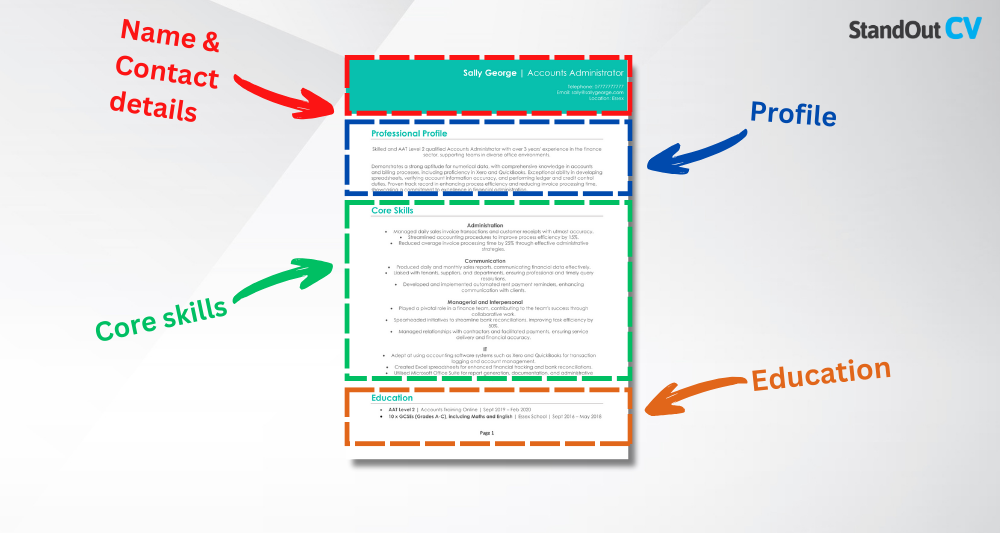
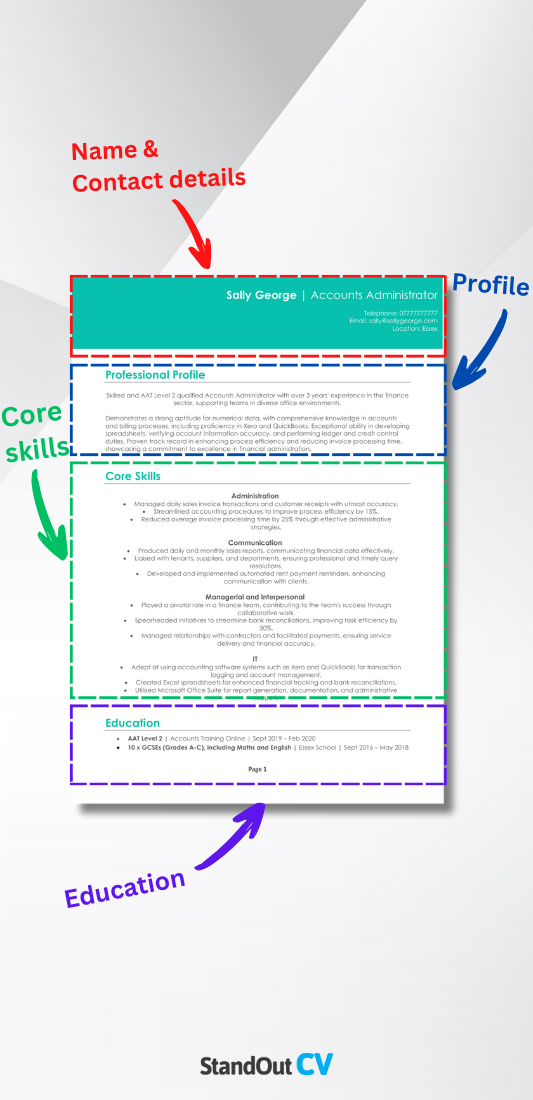
As with every CV, it’s important that recruiters are able to easily find the skills and expertise that you’re bringing to the table. A clear CV structure and a navigable layout will accomplish that.
Here’s how you should structure your skills based CV:
- Name and contact details – Keep contact details at the top, so employers can easily reach out. Having a picture of yourself is entirely optional, and depends on the role.
- Profile – Start off with an introduction of yourself, your career stage, your key expertise, and the value you’ll bring to any companies that hire you.
- Skills – The main part of a skills based CV, categorise and list off your biggest strengths.
- Education – Outline your academic qualifications and certificates, detailing the most relevant.
- Work experience – Walk recruiters through any past jobs you’ve held.
- Additional info – You can also make a note of relevant hobbies and interests and impressive awards.
Writing a skills-based CV profile
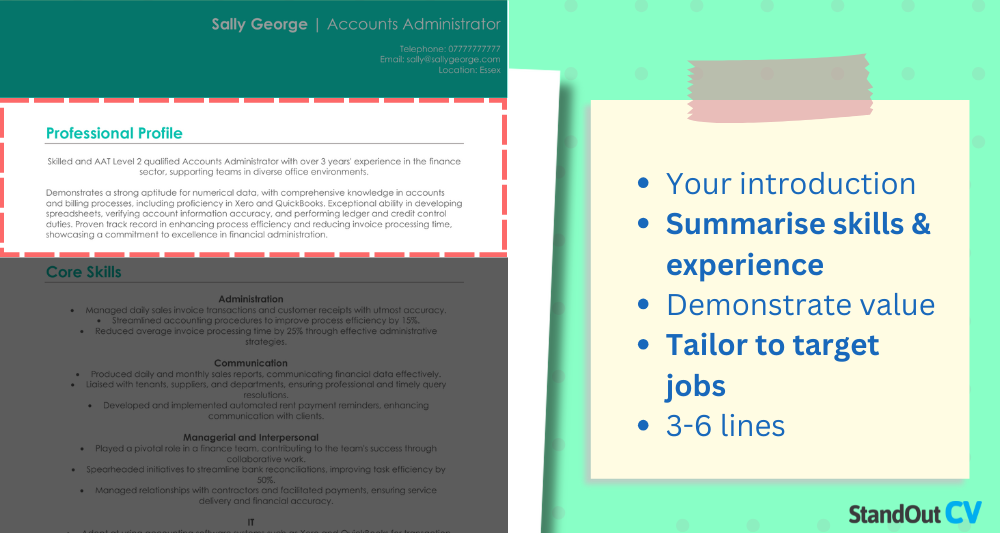
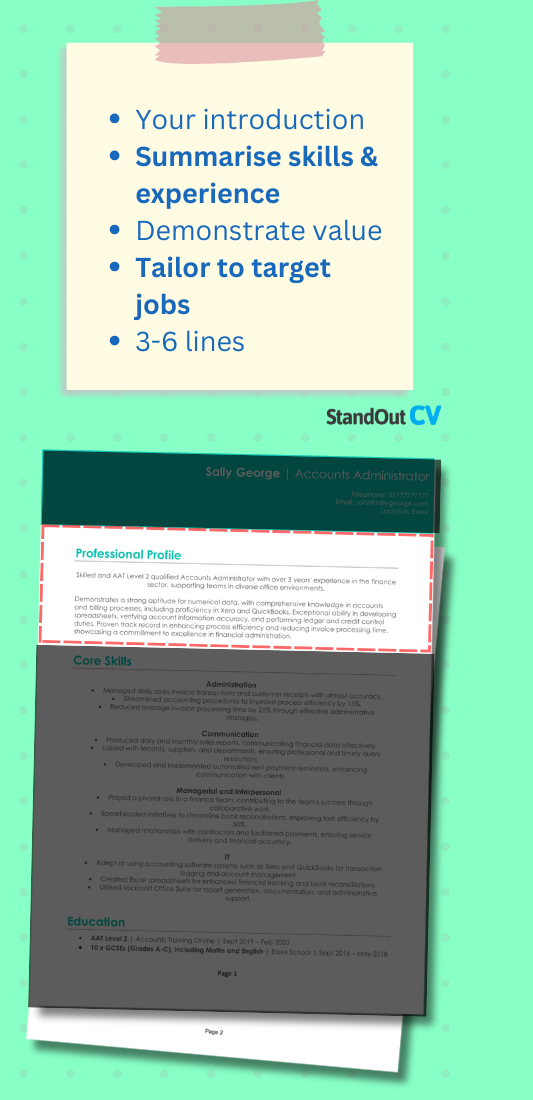
Your profile (or personal statement, for junior candidates), is an essential aspect of any CV, no matter which type. It should quickly introduce you and your career stage, before focusing in on your most important skills.
Like any CV profile, you need to convey to recruiters the benefits they’d enjoy if they hired you. Sell yourself by walking them through your biggest strengths, demonstrating the value you’d bring to their company. Ideally, emphasise transferable skills, especially if you’re making a career change.
Skills-based CV profile examples
Profile 1
Organised Admin Assistant with over three years of experience supporting office operations in fast-paced environments. Skilled in managing schedules, coordinating meetings, and handling correspondence with efficiency and professionalism. Proficient in Microsoft Office Suite, calendar management tools, and data entry software. Known for excellent attention to detail and maintaining accurate records while meeting deadlines consistently.
Profile 2
Dedicated Retail Worker with two years of experience in customer service and sales for high-street fashion brands. Skilled in assisting customers, managing inventory, and handling transactions with accuracy. Proficient in using point-of-sale (POS) systems and delivering a positive shopping experience. Recognised for meeting sales targets and creating strong customer relationships in busy retail settings.
Structuring your education section
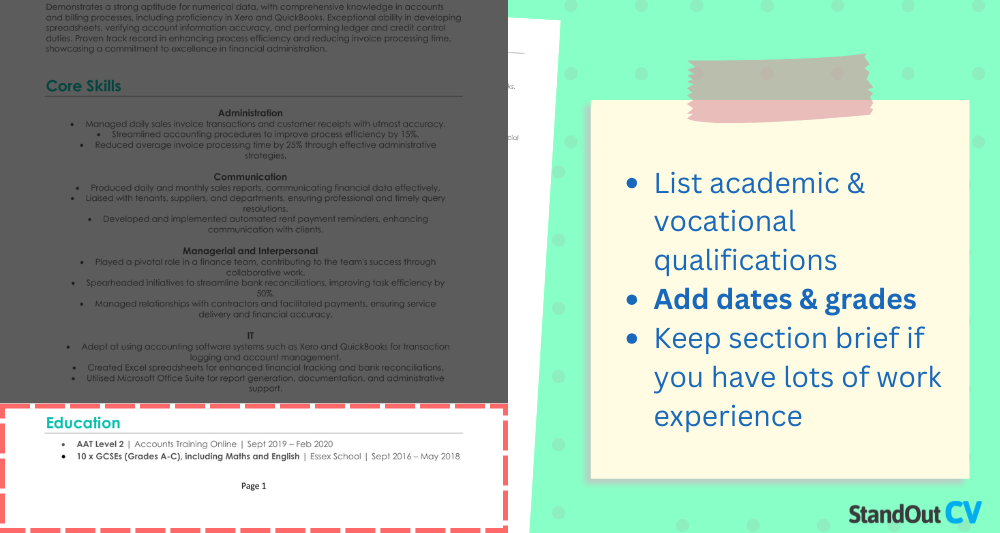
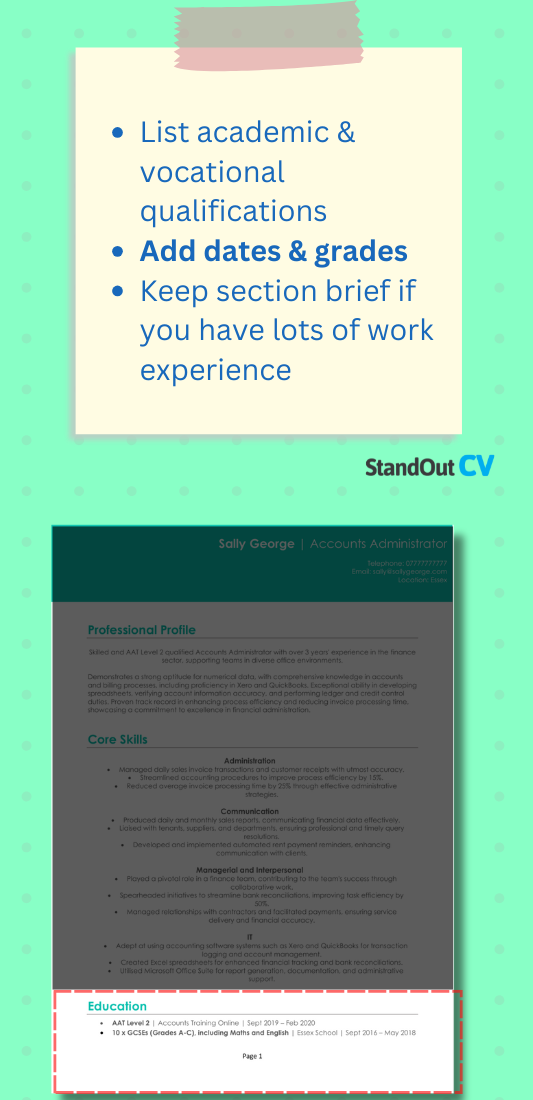
The education section is a short but crucial part of your functional CV. You’ll need to give an overview of your academic foundations.
Walk recruiters through your certificates, degrees, and other relevant courses. List them in reverse chronological order, starting from your most recently-earned qualifications. Junior candidates should provide more detail on the most relevant and recent ones, outlining things like specific modules and projects.
Struggling to showcase your skills effectively?
With our CV builder, you can highlight your strengths using structured templates, hundreds of pre-written skills to add, and expert guidance – perfect for a skills-based CV that makes an impact.
Skills types for your CV
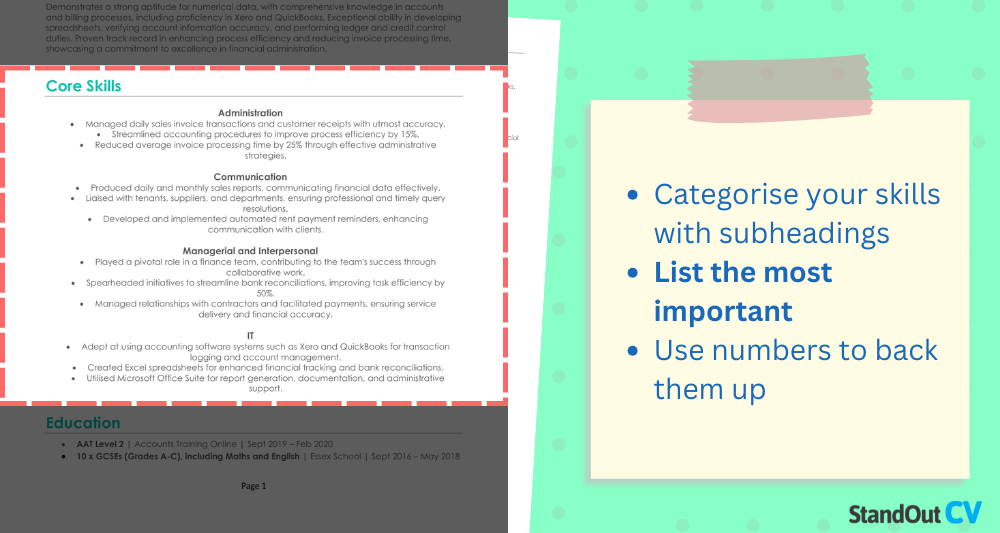
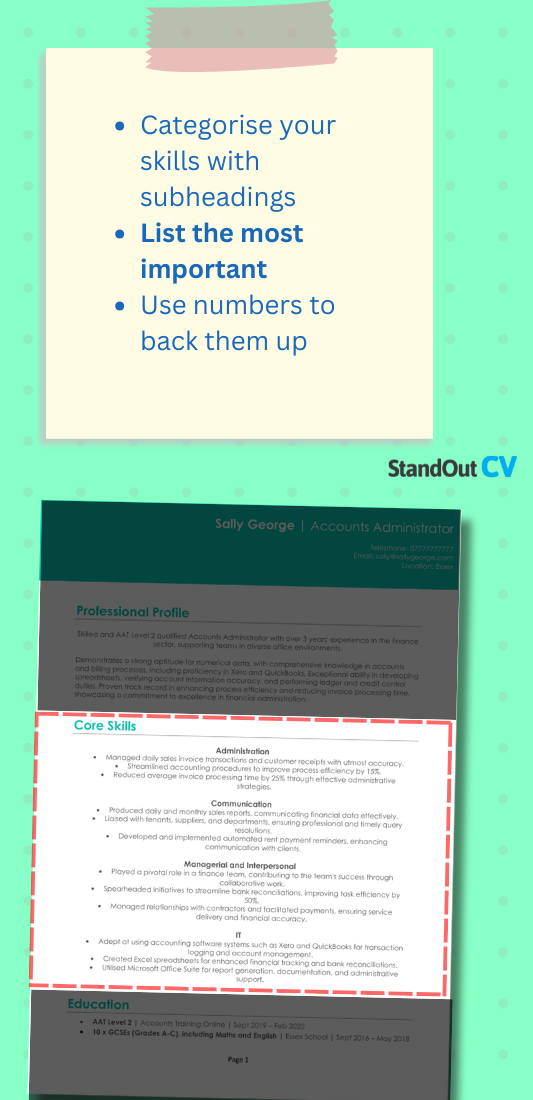
This is the centrepiece of any skills based CV. The skills you include in your CV will, of course, depend on the roles you’re applying for. Every job has its own unique requirements, so it’s crucial to research your target positions thoroughly to identify the key skills employers value most.
Once you know what they’re looking for, you can tailor your CV to reflect those skills and demonstrate how you meet their expectations. There are some examples of the categories you might want to include below.
Communication skills
- Delivering presentations to clients to pitch ideas and solutions
- Writing detailed reports for management teams to aid decision-making
- Conducting team briefings to ensure consistent messaging
- Handling email correspondence with clients or stakeholders
Leadership skills
- Managing and mentoring a team of five to exceed targets
- Setting clear team objectives and monitoring individual progress
- Organising team-building activities to improve collaboration
- Leading strategy meetings to align team efforts with company goals
Customer service skills
- Assisting customers with complex product queries to drive sales
- Resolving complaints quickly while maintaining a positive customer experience
- Training junior staff on handling difficult customer interactions
- Upselling products and services to meet customer needs
Management skills
- Overseeing the delivery of five concurrent projects on time and within budget
- Allocating resources effectively to maximise productivity
- Coordinating with external contractors to ensure seamless service delivery
- Developing long-term project plans to align with organisational goals
Finance skills
- Preparing detailed financial forecasts and budgets for senior management
- Reducing company costs by negotiating better supplier terms
- Managing payroll processes accurately and on time
- Conducting financial audits to identify and eliminate inefficiencies
IT skills
- Designing and automating spreadsheets in Excel to improve reporting efficiency
- Developing a mobile-friendly company website to enhance user experience
- Rolling out new CRM software across multiple departments
- Troubleshooting IT systems to minimise downtime
Workplace skills
- Planning and implementing a new office absence reporting system
- Identifying inefficiencies in workflows and implementing fixes
- Collaborating with colleagues to ensure high-quality project delivery
- Maintaining compliance with health and safety standards
Creative skills
- Designing marketing materials for social media campaigns
- Creating engaging content for company blogs and newsletters
- Proposing new branding concepts to align with target audience preferences
- Leading brainstorming sessions to develop innovative advertising ideas


